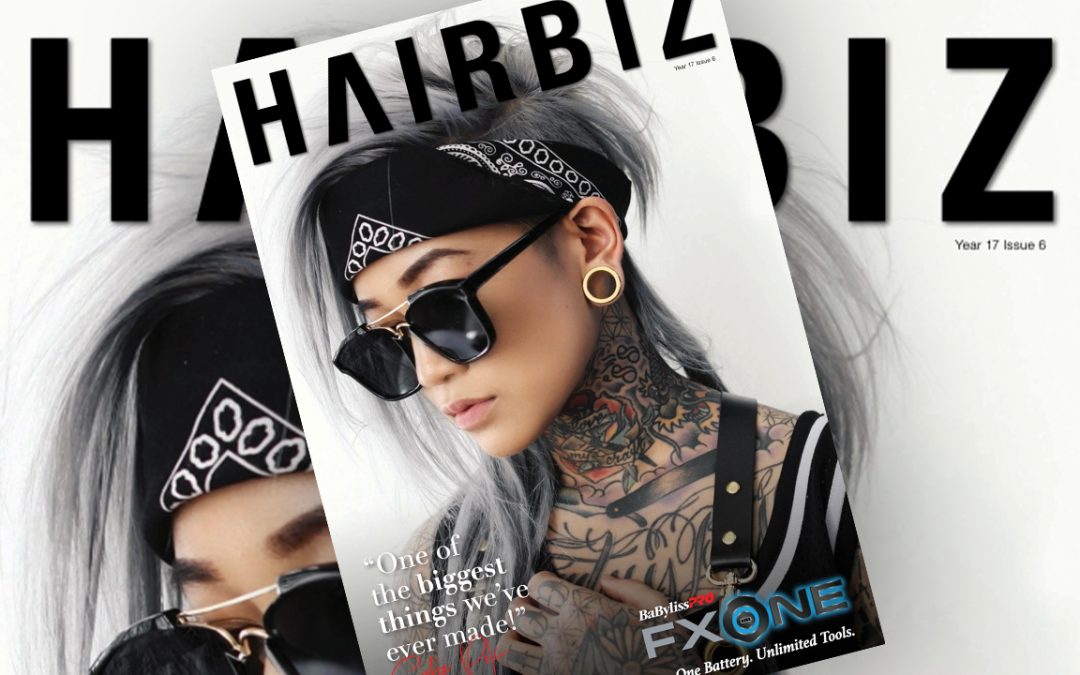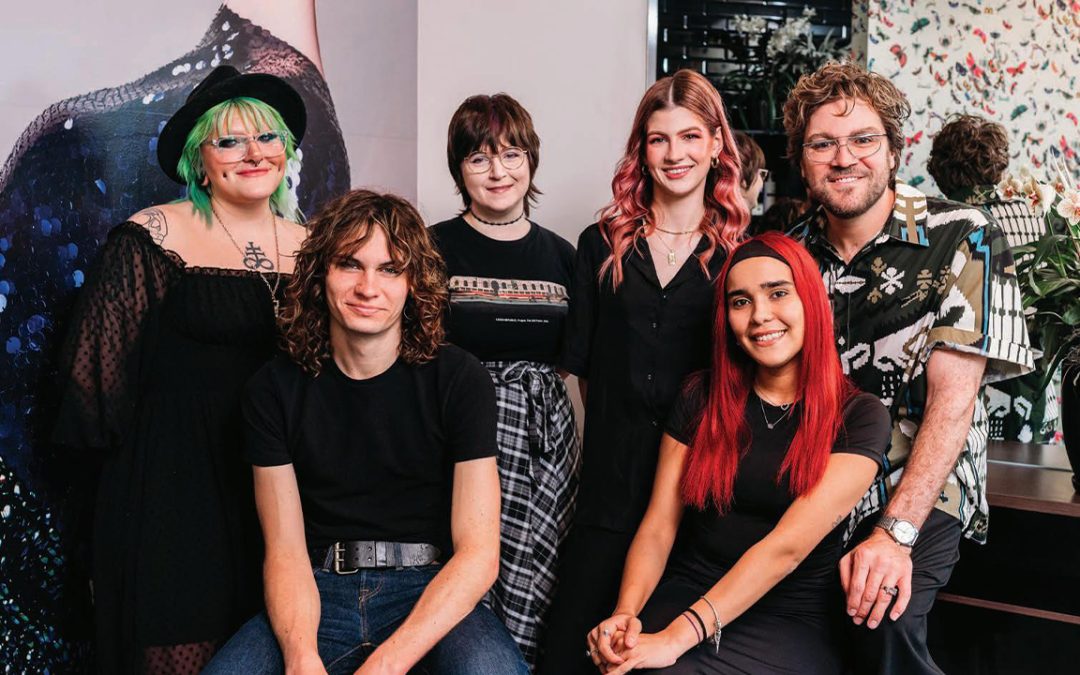
Best in Australian Hair Announced at 4th Annual AHIA Creative Awards Gala
Monday 1st July saw Australia’s leading creatives celebrating at The Star, Sydney for the annual Australian Hair Industry Awards Creative 2024 gala evening. After a record-breaking showing by Australia’s most inventive hair minds, Adelaide’s Sam James, of acclaimed salon SJ Establishment, was the recipient of the biggest award of the night- AHIA Australian Hairdresser of the Year 2023. Major winners included Andrew Cobeldick, Buoy Salon and Spa for AHIA New Zealand Hairdresser of the Year 2024, Mark Leeson, Mark Leeson for AHIA International Hairdresser of the Year 2024 and Jamie Carroll honoured with the Dennis Langford Hall Of Fame Award.
Held on the final night of HAIR FESTIVAL, the evening was again MC’d by resident Mocha Group host, Will Fennell, with three incredible shows conceptualised and choreographed by the always surprising Adam Williams with more hair, fashion and entertainment moments than ever before. The 2024 Creative Couture opening performance by 2023 AHIA Australian Hairdresser of the Year Justin Pace and 2023 AHIA New Zealand Hairdresser of the Year, Danny Pato, assisted by the 2023 Hot Shots team turned the Avant-Garde theatrical thermos to full blast. Then, iconic salon group Oscar Oscar celebrated their milestone 35th anniversary in style with Jacky Chan creating stunning looks with partner REDKEN, before international darling Natalie Anne recalibrated the catwalk in a showcase filled with it-girl cool to close out the night. Guests then headed to the on-site after party hosted by Rogue Beauty until the small hours of the morning.
Launched in 2012 by respected industry pioneers Mocha Group, the AHIA’s are celebrating their 12th year as the trusted national award platform which provides a benchmark of excellence across both specialist and individual Educational and Business categories and the third year that the Creative categories have been given their own awards program.
Within the comprehensive awards division from Mocha Group, the AHIA Creative Awards program highlights the creation and execution of trends focused photographic collection work representative of the exciting talent across the hair and barber industries. Entries this year were judged by international hair icons including Sally Brooks, Sam McKnight, Cos Sakkas, Hooker and Young, Candy Shaw and Vivienne MacKinder, not to mention influential figures from International Media including Charlotte Grant West from HJI, UK, Nicky Pope from Tribu.te Magazine, UK, and Veronica Boodhan from Salon Magazine, Canada.
The evening also saw the announcement of the much-anticipated 2024 HOT SHOTS team judged by local legends including Justin Pace, Jayne Wild, Scott Sloan, Benni Tognini and Mary Alamine. This unique initiative puts a spotlight on the industry’s most exciting next-gen talent and provides the chance for those 31 and under to take their career to a whole new level. The very first Medal of Honour recipients were also acknowledged, recognising their achievement of winning award categories three years in a row, with Stevie English for AHIA Master Colourist of the Year and Danny Pato for AHIA New Zealand Hairdresser of the Year.
Mocha Group Owner and Founder Linda Woodhead acknowledged that the future of the industry is in excellent hands;
“With the sheer number of entries this year, every winner should be so proud of their achievement. The quality collections and exciting creativity that our industry has put forward is truly world-class and testament to the strength and sustainability of the industry. Congratulations to all of our deserving winners.”
Special thanks goes to Major Sponsors Redken, Amazing Hair, Excellent Edges and NatalieAnne Haircare and Supporters Jadore Hair Supplies, Gamma+, Danger Jones, Matrix, Hair Festival, Dateline Imports, Heiniger, O&M, Expo4Barbers, Schwarzkopf, Rogue Beauty, Joico and EVY Professional.
www.mochagroup.com.au
Facebook: mocha hair Instagram: @mochahairaustralia
#ahia2024 #hotshots2024
2024 AHIA CREATIVE WINNERS
APPRENTICE OF THE YEAR
Hunter Kostrubiec, Tsiknaris Hair
EMERGING STYLIST OF THE YEAR
Ella Stewart, Stevie English Hair
NEW CREATIVE TALENT OF THE YEAR
Paige Cameron, Cobelle Creative
MEN’S HAIR SPECIALIST OF THE YEAR
Luke Munn, Havachat Barbershop
AVANT GARDE HAIRDRESSER OF THE YEAR
Danny Pato, D&M Hair Design
COLLECTIVE TEAM OF THE YEAR
Breakthrough Team
(Laura Szakaly, Tia Wright-Pihama, Liam Johnson, Delphine Kanuma)
MASTER CUTTER OF THE YEAR
Shae Tsiknaris, Tsiknaris Hair
MASTER COLOURIST OF THE YEAR
Amber Bullock, Bond Hair Religion
AI COLLECTION OF THE YEAR
Johnny Georgiou
SALON TEAM OF THE YEAR
Bond Hair Religion
HOT SHOTS TEAM
Adam Harant, Wild Life SoGo
Domi Cherie, Tsiknaris Hair
Ella Stewart, Stevie English Hair
Victoria Shayler, Sir Fletcher
MEDAL OF HONOUR
Stevie English
Danny Pato
NSW/ACT HAIRDRESSER OF THE YEAR
Jenni Tarrant, Bond Hair Religion
VIC HAIRDRESSER OF THE YEAR
Benjamin Martin, Salon XVI
QLD HAIRDRESSER OF THE YEAR
Krystle Tokunai, Tokunai Hair
WA/NT HAIRDRESSER OF THE YEAR
Jude McEwen, Toni&Guy Perth
SA/TAS HAIRDRESSER OF THE YEAR
Lisa Robertson, Parlour Glenelg
NORTH ISLAND HAIRDRESSER OF THE YEAR
Ella Thompson, Dharma
BTS DREAM TEAM OF THE YEAR
For Jenni Tarrant, Bond Hair Religion NSW/ACT Collection
COLOURIST – Amber Bullock
PHOTOGRAPHER – Andrew O’Toole
MAKE UP ARTIST – Kylie O’Toole
STYLIST – Catherine V
DENNIS LANGFORD HALL OF FAME AWARD
Jamie Carrol
INTERNATIONAL HAIRDRESSER OF THE YEAR
Mark Leeson, Mark Leeson
NEW ZEALAND HAIRDRESSER OF THE YEAR
Andrew Cobeldick, Buoy Salon and Spa
AUSTRALIAN HAIRDRESSER OF THE YEAR
Sam James, SJ Establishment





